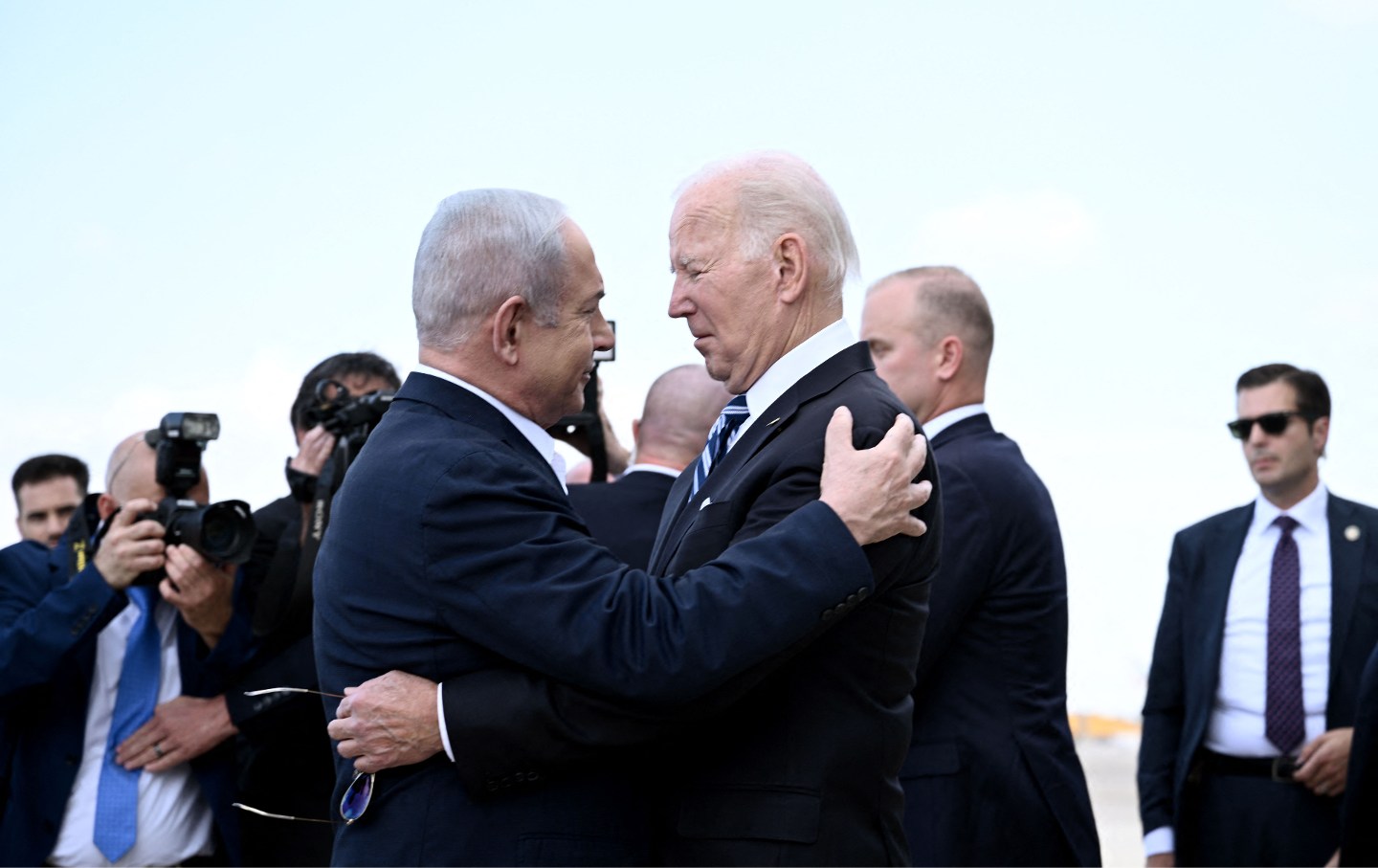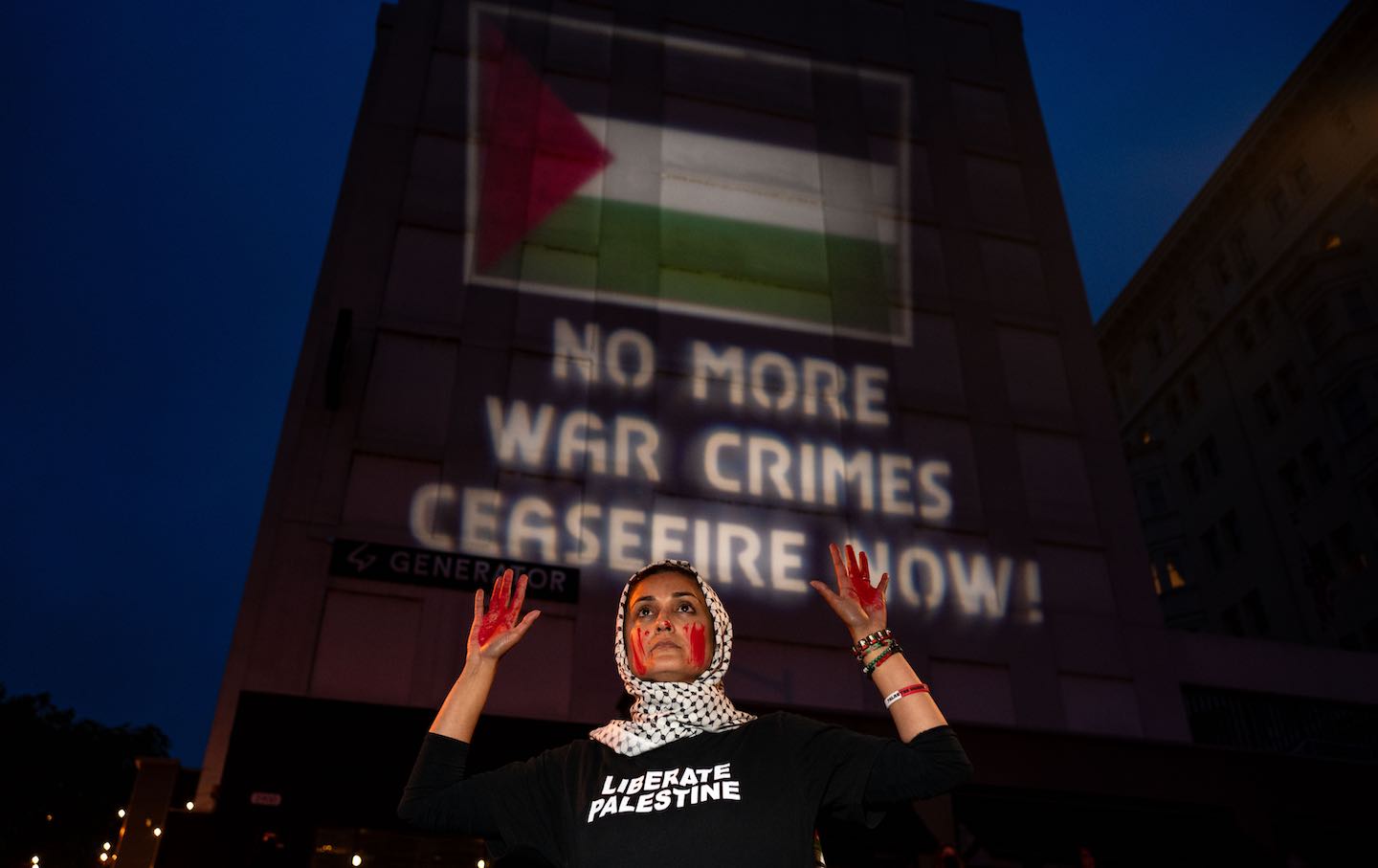The Lesson of 9/11 Is That Israel Cannot Win Its Gaza War
Biden says he doesn’t want Israel to repeat America’s mistakes, so why is he supporting Israel as it does exactly that?

Benjamin Netanyahu greets Joe Biden upon his arrival at Tel Aviv’s Ben Gurion airport on October 18, 2023.
(Brendan Smialowski / AFP via Getty Images)Imagine for a moment that America never invaded Afghanistan after 9/11.
Imagine that in an alternate universe a variant of George W. Bush decided to test the Taliban’s offer to hand over Osama bin Laden for trial in a third country in exchange for the ample proof the United States had of his culpability, rather than rejecting it as a cynical tactic to delay the war. Imagine that this ersatz Bush focused the US’s military, intelligence, and law enforcement powers, then at their post–Cold War heights, exclusively on the Al Qaeda leadership that designed and orchestrated the attacks.
At the time, it would have been supremely politically risky, given the bloodlust that had consumed the country. And the outcome of the approach would have been uncertain. There would have been relentless pressure on doppelgänger-Bush to escalate this more targeted response as it hit some inevitable snags.
We can only imagine this alternate timeline. But the consequences of the real-world decision to invade Afghanistan as the first act in a Global War on Terror are all too clear. We don’t have to imagine what choosing another path would have spared us. We would have been spared a futile, pitiless war that lasted two entire decades—a war marked by atrocities, one that by conservative estimates killed at least 176,000 people. We would have been spared a war that never had a coherent, credible plan for victory, despite the relentless prevarications to the contrary by an entire generation of US policymakers. We would very likely have been spared the Iraq War, as well, with its own abyss of agonies and futilities. We definitely would have been spared the decisive Taliban victory of August 2021.
It should not be controversial to recognize that it would have been better never to have fought the war at all. That is why it is sickening to watch President Biden warn Israeli Prime Minister Benjamin Netanyahu to heed the lessons of 9/11 while simultaneously giving Israel carte blanche for its collective punishment of Gaza. In the name of avenging the Hamas atrocities of October 7, Biden is letting Israel pursue a course of civilian bloodletting, rather than choose a path that is politically riskier but that, as we in the US know all too well by now, is likelier to yield a better outcome.
That path can only start with an immediate cease-fire. It is the only way out of the nightmare that is already developing. But the Biden administration opposes it—even while it has acknowledged, in the words of a senior Pentagon official, that the war is yielding a “prospect for much more significant escalation against US forces and personnel in the near term.“
Over the past week, the Biden administration has made a greater show of concern for Palestinian civilians trapped in Gaza. But this concern has been long on rhetoric and short on material help. Biden brokered access for trucks delivering food, medicine, and other aid to Gazans through the Rafah Crossing—just nowhere near the amount necessary to sustain the lives of 2.3 million people who must dodge a relentless barrage of air strikes (for instance, Israel said on Tuesday that it had struck Gaza 400 times in just 24 hours). Pentagon officials spoke Monday about offering Israel “best practices for mitigating civilian harm,” as if America’s recent experiences of urban counterinsurgency were not reasons to avoid the enterprise altogether.
Or, for that matter, as if Israel were interested in those lessons. “The emphasis,” according to a widely quoted statement from the Israel Defense Forces on October 10, “is on damage, not precision.” With food shipments into Gaza down to 2 percent of what would have been delivered even under what has passed for normal during 16 years of Israeli blockade, Oxfam said on Wednesday that Israel is using starvation as a weapon of war.
Yet the White House message, delivered by Biden’s national security spokesman John Kirby on Tuesday, was that while the administration’s heart might bleed for the Palestinians, “a cease-fire, right now, really only benefits Hamas.”
“It is ugly and it’s going to be messy, and innocent civilians are going to be hurt going forward,” Kirby continued. As of Tuesday, an estimated 2,360 Palestinian children in Gaza will forever be unavailable for comment about whom a cease-fire benefits.
Shockingly, Biden on Wednesday cast doubt on whether “the Palestinians are telling the truth about how many people are killed,” a statement that will overshadow his claims to seek the protection of civilians for the remainder of the war. As of this writing, some 6,500 Palestinians have been killed, according to the Health Ministry in Gaza, whose statistics the State Department recently cited in its annual human rights report.
In Israel, while warning his interlocutors not to repeat the rage-fueled “mistakes” of the US War on Terror, Biden attended a meeting of Netanyahu’s war cabinet. That made it conspicuous when, in his subsequent address urging Americans to accept $74 billion in additional weapons spending for Israel and Ukraine as part of a $105 billion package, Biden offered no explanation of how Israel’s incipient war would achieve its objective of destroying Hamas. Biden sounded like Bush in 2003, asking for $87 billion to throw into the maw of the Iraq War with no chance of success, only faith that US violence would be sufficient to prevail. So, for that matter, does Netanyahu, who speaks often of the “long war” Israel intends to wage in Gaza. The New Yorker’s Susan Glasser reported that the Israelis told Biden’s team “to expect a war that could last as long as ten years.”
The unambiguous lesson of the War on Terror is that a war that lasts for a decade is not a war its architects understand how to win. In Iraq and Afghanistan, US generals equated maintaining the war with winning it, and the only results were death, suffering, and failure. Israel’s recent wartime experiences with comparable endeavors are no more promising. Two decades of occupying southern Lebanon did not destroy the Palestine Liberation Organization. Nor did Israel’s return to war in Lebanon in 2006—another war launched after a terror group took Israelis hostage—meet its objective of destroying Hezbollah, which today threatens to open a second front on Israel’s northern frontier. All Israel accomplished was the killing of human beings in great numbers, and the creation of motivated, experienced enemies that often grew in strength. It requires willful disregarding of extremely recent history to believe that an invasion of Gaza will end any other way.
Popular
“swipe left below to view more authors”Swipe →There is an alternative. The US could heed the demands of the Palestinians, most of its Arab allies, and much of the world beyond and back a cease-fire. Recent reporting suggests that Hamas appears to have miscalculated about the Israeli response to October 7, a factor that may be informing its recent prisoner releases. As the chief patron of Israel and the reigning great power in the Middle East, the US owes it to Israelis and Palestinians to at least explore a linkage between hostage releases and de-escalation—something that Israel’s announced pause in the invasion, ostensibly to permit US military assets to arrive in the Middle East, buys time to test. As Defense Minister Yoav Gallant, who infamously called Palestinians “human animals” at the dawn of the war, acknowledged this week when the US pressed for the aid deliveries, “we are not in a place where we can refuse” should the Americans insist on shifting course.
Some of those pushing hardest against the coming war are those whose loved ones Hamas killed or kidnapped in the kibbutzim abutting Gaza. As Orly Noy reported for +972, Noi Katsman eulogized her slain brother Hayim with an appeal “not to use our deaths and our pain to cause the death and pain of other people or other families. I demand that we stop the circle of pain, and understand that the only way [forward] is freedom and equal rights.” Katsman understands whom a cease-fire benefits more than the White House seems to. She also has a better grasp of the lessons of 9/11.
Thank you for reading The Nation!
We hope you enjoyed the story you just read, just one of the many incisive, deeply-reported articles we publish daily. Now more than ever, we need fearless journalism that shifts the needle on important issues, uncovers malfeasance and corruption, and uplifts voices and perspectives that often go unheard in mainstream media.
Throughout this critical election year and a time of media austerity and renewed campus activism and rising labor organizing, independent journalism that gets to the heart of the matter is more critical than ever before. Donate right now and help us hold the powerful accountable, shine a light on issues that would otherwise be swept under the rug, and build a more just and equitable future.
For nearly 160 years, The Nation has stood for truth, justice, and moral clarity. As a reader-supported publication, we are not beholden to the whims of advertisers or a corporate owner. But it does take financial resources to report on stories that may take weeks or months to properly investigate, thoroughly edit and fact-check articles, and get our stories into the hands of readers.
Donate today and stand with us for a better future. Thank you for being a supporter of independent journalism.
Thank you for your generosity.
More from The Nation

Who’s Afraid of the International Criminal Court? Who’s Afraid of the International Criminal Court?
In two decades, the ICC has never indicted a Western official. But a warrant may be coming for Benjamin Netanyahu.

Rafah Is in Panic as the Israeli Invasion Begins Rafah Is in Panic as the Israeli Invasion Begins
With Israeli forces entering Gaza’s southernmost city, scenes from the Nakba are being repeated in the strip’s last refuge.

Local Elections in Britain Put the Labour Party’s Stance on Gaza Under the Spotlight Local Elections in Britain Put the Labour Party’s Stance on Gaza Under the Spotlight
Labour leader Keir Starmer is favored to win the UK’s general election later this year, but—as with Joe Biden—there is one word that could derail his campaign: Gaza.

It’s Time to Stop Ignoring the Sexual Violence Happening in Gaza It’s Time to Stop Ignoring the Sexual Violence Happening in Gaza
As long as our outrage is selectively assigned only to specific victims in specific contexts, we are lying to ourselves about the reality of violence in war zones.

The Protesters’ Call for Divestment Is Not a Technical One The Protesters’ Call for Divestment Is Not a Technical One
It is a question of will, not capacity.

The Invisible Lives of Israel’s Thai Workforce The Invisible Lives of Israel’s Thai Workforce
Manee Jirchat was one of the 31 Thai laborers kidnapped by Hamas on October 7. This is his story.


